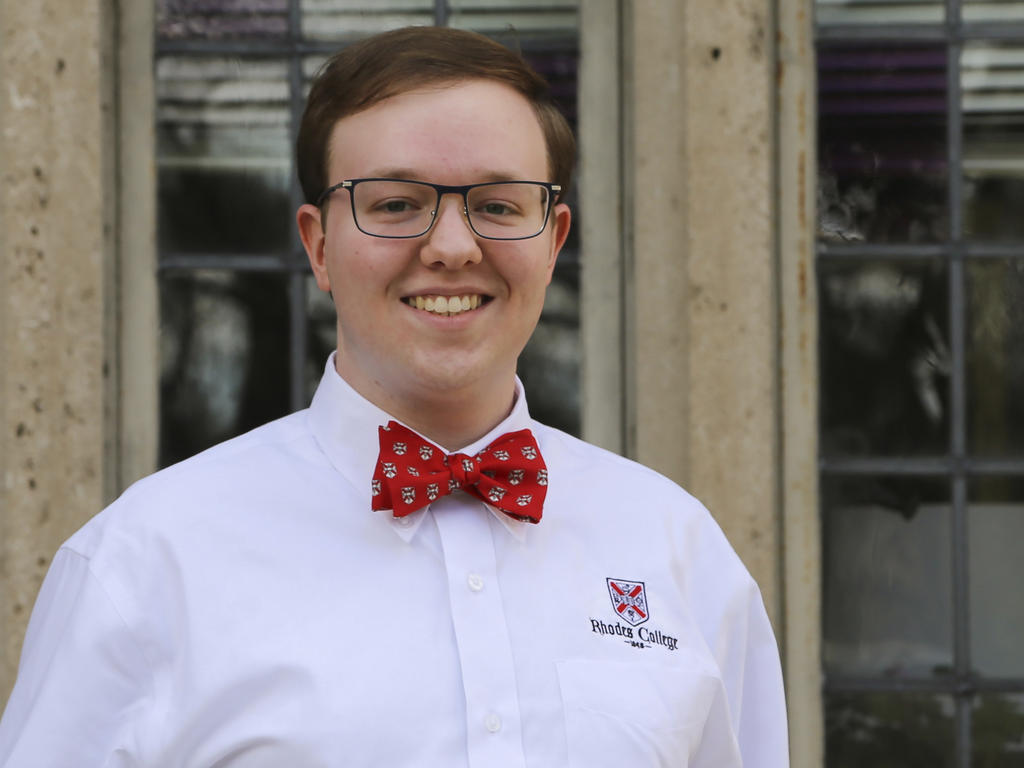Biochemistry and molecular biology (BMB) major Taylor Elliott ’23 has been a Rhodes Le Bonheur Summer Plus Research Fellow at Le Bonheur Children’s Hospital since his sophomore year. Last December, Elliott was invited to the annual American Epilepsy Society (AES) conference in Chicago, where he presented his clinical research project on the anti-seizure medication cenobamate (CNB) as the primary researcher, making him the first Rhodes student to attend the event.
A native Memphian, Elliott likes to say he’s been pre-med for as long as he can remember. He gained medical experiences in the Memphis area even before starting college, including four years at Baptist Memorial Hospital-Collierville and two years at UT/Methodist University Hospital during high school. Coming to Rhodes, Elliott was introduced to additional opportunities for clinical experience through Rhodes’ Health Professions Advising (HPA) department.
“I was immediately drawn to the Le Bonheur program,” says Elliott. “It offers a full clinical experience that concludes with the completion of a research project, so it’s an amazing opportunity for students in any discipline on the pre-med track.”
“It was the right decision for me and has since reaffirmed my interest in pursuing a professional degree in medicine. I am most interested in patient care, and seeing how small applications in medicine can make major improvements in the lives of pediatric patients has made the overall experience very rewarding for me.”
As part of the program, Elliott has been working as a clinical research assistant at Le Bonheur’s Neuroscience Institute in the comprehensive epilepsy program and is advised by Dr. Jonathan Fitz Gerald in Rhodes’ Department of Biochemistry and Molecular Biology for academic support. He was the first BMB major to apply to the Le Bonheur program, which typically attracts neuroscience majors, as fellows work in a neurology clinic. “As the only BMB applicant to the program, I quickly fell in love with neurology and neuroscience and enjoyed being able to see the overlap between the two disciplines. I came into the program eager to absorb every opportunity I could. While I felt prepared to rise to any challenge that was presented, I developed skills in notetaking, medical scribing, patient observation techniques, clinical research objectives, and scientific writing.”
Knowing his background, Elliott’s mentor, Dr. Jim Wheless, director of Le Bonheur’s Neuroscience Institute, guided him to find a project that could unify the fields of clinical neurology and biochemistry. Subsequent clinic visits with Dr. Wheless inspired him to complete a real-world study of pediatric patients and their responses to cenobamate, a relatively new anti-seizure medication prescribed to adults and adolescents with epilepsy. His research was the first to look at cenobamate’s impacts on the pediatric population and the previously excluded population of patients allergic to drugs that can be used in conjunction with the medication.
“Results showed greater than 60 percent significant reduction in seizure frequency and intensity, with some patients achieving seizure freedom for a few months,” says Elliott. “This medication can also provide relief for patients taking multiple medications with no symptom reduction. Our results show that it can be applied in epilepsy clinics across the country to the benefit of those patients needing a reduction in the number and severity of seizures they experience. That is why it is so important to continue working on its possible applications, especially for the youngest population of epilepsy patients, those aged 2 to 11 years.”
He submitted the abstract of his research to the American Epilepsy Society (AES) and was invited to give an in-person presentation at their December 2021 conference. Elliott then authored a full manuscript for the research, which has been published in the Journal of Pediatric Neurology.
“The AES annual conference is a place for researchers, physicians, and anyone who provides epilepsy care of varying degrees to come together and share their wisdom with other providers in the hopes of spreading awareness for certain diseases, new and promising medications, and skills and techniques that can alleviate stress and suffering of all epilepsy patients,” he explains.
At the conference, he was able to talk with and gain feedback from physicians, researchers, and pharmaceutical representatives from varied backgrounds. “I found myself talking with a physician from Brazil, a researcher from California, and representatives from companies all over the globe,” says Elliott.
“I felt like this was where I belonged. The most gratifying thing that I have witnessed time and time again at Le Bonheur, but experienced firsthand at the AES Conference, was that collaboration is far more important to medicine than the competition. Medicine is such a diverse and developing field, brimming with an even more diverse population of caregivers. Participating in the conference reaffirmed my passion for medicine, confirmed my interest in the biochemistry of neurology, and has inspired me to continue researching. Throughout this experience, I remain thankful for the guidance and support at Le Bonheur of Dr. Jim Wheless, Dr. Tracee Ridley-Pryor, and Mr. Andrew Gienapp.”
Tram Truong ’24
